 Petzlover
Petzlover Braque d'Auvergne is originated from France but Irish Mastiff Hound is originated from United States. Braque d'Auvergne may grow 26 cm / 10 inches shorter than Irish Mastiff Hound. Braque d'Auvergne may weigh 12 kg / 26 pounds lesser than Irish Mastiff Hound. Braque d'Auvergne may live 3 years more than Irish Mastiff Hound. Both Braque d'Auvergne and Irish Mastiff Hound has almost same litter size. Braque d'Auvergne requires Low Maintenance. But Irish Mastiff Hound requires Moderate Maintenance
Braque d'Auvergne is originated from France but Irish Mastiff Hound is originated from United States. Braque d'Auvergne may grow 26 cm / 10 inches shorter than Irish Mastiff Hound. Braque d'Auvergne may weigh 12 kg / 26 pounds lesser than Irish Mastiff Hound. Braque d'Auvergne may live 3 years more than Irish Mastiff Hound. Both Braque d'Auvergne and Irish Mastiff Hound has almost same litter size. Braque d'Auvergne requires Low Maintenance. But Irish Mastiff Hound requires Moderate Maintenance
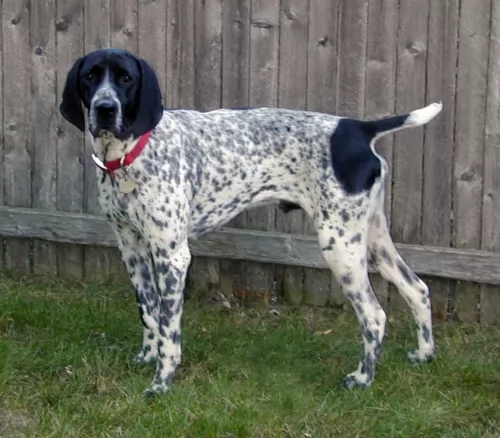 Sometime over 5 centuries ago, in the Cantal Region of France, was born a hunting breed, that might be the real ancestor of today’s pointing hunter dogs. Perhaps the oldest of all pointing gun dog is the Braque d’Auvergne. This breed comes from Central France in the region of Auvergne. This breed was developed prior to written dog breeding records in order to hunt in this region and find, point, flush out and retrieve fowl. This breed is clearly one of if not the oldest breeds in the French Braque. There is no agreement among historians on what breed is the oldest of the European pointing dogs and where they were developed – was it Spain or was it France? It is thought that the Braque Francais Gascogne is the original one of these in the early 1600’s while the Braque d’Auvergne came soon after. Due to the different hunting needs in the different parts of France, the Braque Francais Gascogne was crossed with a lot of other local scent hounds. The Braque d’Auvergne is one of the very oldest of all of these. There are records of the breeds existence in the 1700’s. It is probable that the Braque d’Auvergne was developed by crossing local dogs with Gascogne as well as with the Petit Bleu de Gascogne and the Grand Bleu de Gascogne.
Sometime over 5 centuries ago, in the Cantal Region of France, was born a hunting breed, that might be the real ancestor of today’s pointing hunter dogs. Perhaps the oldest of all pointing gun dog is the Braque d’Auvergne. This breed comes from Central France in the region of Auvergne. This breed was developed prior to written dog breeding records in order to hunt in this region and find, point, flush out and retrieve fowl. This breed is clearly one of if not the oldest breeds in the French Braque. There is no agreement among historians on what breed is the oldest of the European pointing dogs and where they were developed – was it Spain or was it France? It is thought that the Braque Francais Gascogne is the original one of these in the early 1600’s while the Braque d’Auvergne came soon after. Due to the different hunting needs in the different parts of France, the Braque Francais Gascogne was crossed with a lot of other local scent hounds. The Braque d’Auvergne is one of the very oldest of all of these. There are records of the breeds existence in the 1700’s. It is probable that the Braque d’Auvergne was developed by crossing local dogs with Gascogne as well as with the Petit Bleu de Gascogne and the Grand Bleu de Gascogne.
In all of Western Europe, the region of Auvergne is not very populated and has unique geography in that is hilly and has many extinct and eroded volcanoes. A lot of the region is still unpopulated. In this environment, wildlife has flourished, and hunting is successful in providing food for the regions people. This circumstance with an abundance of birds, led to the breeding of the Braque Auvergne to specialize in hunting in this area. The breed is not very popular outside of Auvergne and probably never was. That fact allowed them to be devastated by the Second World War. The Reunion des Amateurs de Braque d’Auvergne (RABA) was started to promote the pure breeding and the protection of the d’Auvergnes. But when Auvergnes was occupied during the war, the slowed breeding of the Braque d ‘ Auvergne almost eliminated the breed. There might have only been about 25 dogs left following the end of the war. These remaining dogs were used to revive the breed, but it is still uncommon, but not rare. Individuals have been imported by other countries including North America. The United Kennel Club (UKC) accepted the breed in 2006 but is not accepted by the AKC (American Kennel Club). The breed is still a working breed and outside of France, very rare.
 The Irish Mastiff Hound is a huge dog – a mix of the English Mastiff and the Irish Wolfhound.
The Irish Mastiff Hound is a huge dog – a mix of the English Mastiff and the Irish Wolfhound.
Both of these dogs have been around for a long time and actually have ancient histories. The Mastiff for instance has origins that date back to ancient times in China, while the Irish Wolfhound has origins that date far back to 391 AD.
Today this dog is regarded as an excellent companion for any home.
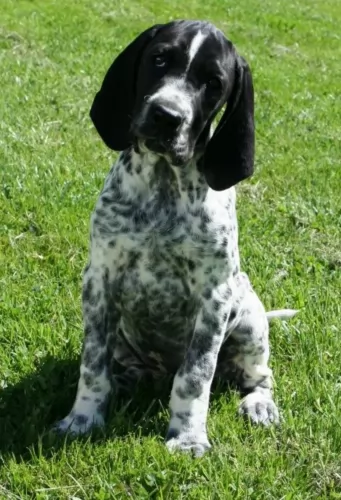 The Braque d’Auvergne is a well built, strong hunting dog with long ears, a large head and a docked tail. His coat is white with black markings and black ears and head. The breed looks a lot like all the other pointing dogs from France. They are medium in stature and has the appearance of a working gundog. He is athletic, muscular and fit. Docking the tail is outlawed in many countries and all of the United Kingdom. In that case the tail is high on the rump and always straight. Their face and head are big for the size of the body and shaped like an oval. With a long muzzle, deep set eyes and a gentle expression, they are kindly and handsome dogs. Their skin is loose but not droopy or wrinkled like hound dogs.
The Braque d’Auvergne is a well built, strong hunting dog with long ears, a large head and a docked tail. His coat is white with black markings and black ears and head. The breed looks a lot like all the other pointing dogs from France. They are medium in stature and has the appearance of a working gundog. He is athletic, muscular and fit. Docking the tail is outlawed in many countries and all of the United Kingdom. In that case the tail is high on the rump and always straight. Their face and head are big for the size of the body and shaped like an oval. With a long muzzle, deep set eyes and a gentle expression, they are kindly and handsome dogs. Their skin is loose but not droopy or wrinkled like hound dogs.
 This is a large crossbreed which can stand at 85 to 91 cm in height and weigh in the region of 47kg to 74kg.
This is a large crossbreed which can stand at 85 to 91 cm in height and weigh in the region of 47kg to 74kg.
He essentially has the short, smooth coat of the Mastiff but other dogs may well inherit the longer, more wiry coat of the Wolfhound. Coloring of the coat can be quite varied and can be brown, grey, white, tan or black. Some dogs take more after the Mastiff while others have more Wolfhound characteristics. They have a large head, some have a somewhat wrinkly face because of the Mastiff side, the ears are fairly small and floppy and the tail is long.
Even though they're so huge, these are easy going dogs that are able to fit in well with most human families. Described as gentle giants, they are loving, loyal, easy-going, even-tempered and eager to please.
The Irish Mastiff does well in the city or in the country because he isn't particularly active and will be happy to have a comfortable spot to lie close to you, however with such a large dog, you will certainly need a garden.
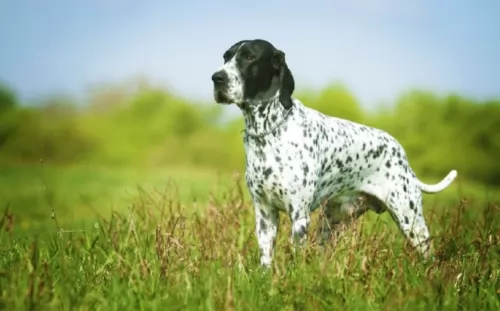 This is a gentle, adaptable and obedient breed. With their intelligence and affectionate nature, they make great family dogs and are eager to please their people. Living with other dogs is fine but not with small, prey size animals. The Braque d’Auvergne should never be left alone pets like gerbils and hamsters. They must be socialized to cats as pets and not prey before living with them successfully. They need to work closely with one human partner. They are first and foremost a hunting dog and need some sort of hunting simulation. They are devoted to their families and want to be constantly in their presence. This can lead to separation anxiety if they are left alone too much. They are great with children and need a family.
This is a gentle, adaptable and obedient breed. With their intelligence and affectionate nature, they make great family dogs and are eager to please their people. Living with other dogs is fine but not with small, prey size animals. The Braque d’Auvergne should never be left alone pets like gerbils and hamsters. They must be socialized to cats as pets and not prey before living with them successfully. They need to work closely with one human partner. They are first and foremost a hunting dog and need some sort of hunting simulation. They are devoted to their families and want to be constantly in their presence. This can lead to separation anxiety if they are left alone too much. They are great with children and need a family.
 Your big Irish Mastiff Hound is cool, confident and calm. He isn't particularly energetic and as long as he gets a nice walk as well as some mental stimulation, he'll be happy, wanting to spend a good part of the day lying close to where you are.
Your big Irish Mastiff Hound is cool, confident and calm. He isn't particularly energetic and as long as he gets a nice walk as well as some mental stimulation, he'll be happy, wanting to spend a good part of the day lying close to where you are.
Socialization and training will be good for him and he learns easily. He is just a big gentle giant who promises to make you a wonderful canine friend.
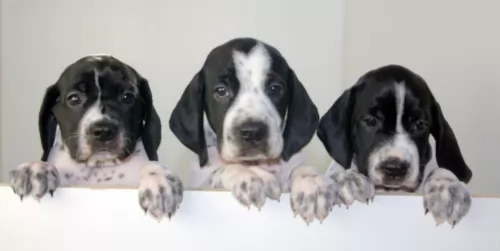 The Braque d’Auvergne is a healthy breed but can face some of the same health concerns as other pointers and hunting dogs. The long, droopy ears can get infected easily if wet and need to be cleaned regularly so that food or dirt are not trapped their either. Because of the small gene pool however they may be at risk for several issues. The breeders in France express concerns about possible hip dysplasia and testing is highly recommended. Because they are at risk for other conditions that might not show up until later in life, it is also recommended that they be tested by the Canine Eye Registration Foundation (CERF) as well as the Orthopedic Foundation for Animals (OFA).
The Braque d’Auvergne is a healthy breed but can face some of the same health concerns as other pointers and hunting dogs. The long, droopy ears can get infected easily if wet and need to be cleaned regularly so that food or dirt are not trapped their either. Because of the small gene pool however they may be at risk for several issues. The breeders in France express concerns about possible hip dysplasia and testing is highly recommended. Because they are at risk for other conditions that might not show up until later in life, it is also recommended that they be tested by the Canine Eye Registration Foundation (CERF) as well as the Orthopedic Foundation for Animals (OFA).
 Many people find giant dogs irresistible because they're usually gentle, patient and loving. However, it is their very size which makes them more prone to certain health concerns and gives them a shorter lifespan.
Many people find giant dogs irresistible because they're usually gentle, patient and loving. However, it is their very size which makes them more prone to certain health concerns and gives them a shorter lifespan.
It is why it is so important to ensure you feed your pet a healthy diet to ward off illness. A large dog like the Irish Mastiff doesn't have a particularly long lifespan, and with good care he can get to 9, 10, 11, 12 years of age.
This condition is more common in large dogs and it can lead to joint degeneration, arthritis and pain. Your pet may even be reluctant to get up and greet you when you come home which can be very sad. Vet intervention will certainly be required.
This heart disease is commonly seen in large dog breeds where the heart becomes weak so that it can't pump blood throughout the body. Coughing, difficulty with breathing, weakness and lethargy are just some of the symptoms of this disease and will also require veterinary intervention.
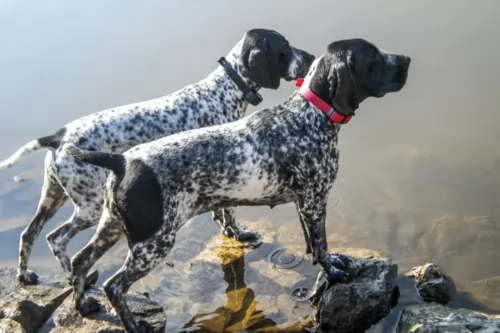 The Braque d’Auvergne needs a high-quality diet fit for a working dog but not too much to make him obese. They are an active breed to choose a formula that is designed for working dogs.
The Braque d’Auvergne needs a high-quality diet fit for a working dog but not too much to make him obese. They are an active breed to choose a formula that is designed for working dogs.
Although no studies have been conducted on the Braque d’Auvergne’s health issues there are many conditions that similar breeds are susceptible to and the d’Auvergne might be as well. This includes any of the following:
This is an active, working dog who needs a lot of stimulation and exercise. The only real appropriate exercise for these dogs is hunting or outings in the woods. He not only needs the exercise, but he also needs to stimulate his sense of smell and his gundog intelligence. He might excel in lure chase or even a form or barn hunt. They certainly could excel at obedience trials and perhaps rally. If you are a weekend hunter then this is the ideal dog for you. They are so easy to train that they surpass other pointers for success with casual hunters. They hunt at a slower pace than many other gundogs. Their intelligence and athleticism lend itself well to agility and flyball also. They need a large (+acres)fenced in area to run and play.
 He has a short coat, and grooming of this laid-back dog will include brushing him twice a week, trimming his nails and making sure that you check inside his ears for ear infection.
He has a short coat, and grooming of this laid-back dog will include brushing him twice a week, trimming his nails and making sure that you check inside his ears for ear infection.
Large dogs have special nutritional needs, particularly because they are more prone to illnesses such as hip dysplasia. You want to make sure that the foods he eats are rich in Omega-3 fatty acids, glucosamine, chondroitin, amino acids and antioxidants because these will ensure proper joint health.
You've got to be careful what you feed a large breed dog because of the weight management issue too. Excess weight puts stress on the joints and promotes the development of osteoarthritis. Speak to your vet about portion control and meat protein for your pet and how to ensure excellent nutrition to avoid common dog illnesses.
Fresh, cool water needs to be available to your pet every minute of the night and day.